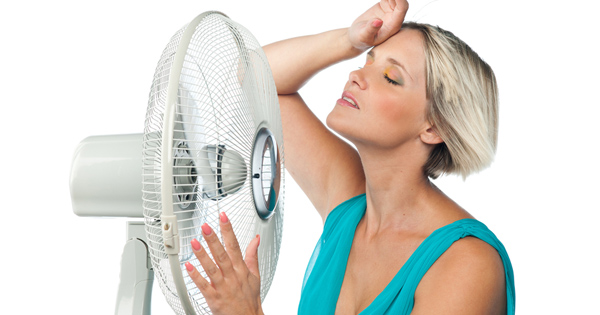What is perimenopause?

Perimenopause is defined as the period of a woman’s life shortly before the occurrence of menopause. It generally occurs for a few years before menopause (mid 40’s), when your body adjusts to new hormone levels.
As your body creates less and less oestrogen, perimenopause symptoms become more evident. This usually occurs in the two years before menopause.
This is also when you experience most of the common menopause symptoms, as oestrogen and progestogen levels fluctuate the most.
It’s important to note that the transition to menopause not only has physical effects, but mental ones too.
Perimenopause symptoms
While hot flushes seem to be synonymous with perimenopause and menopause, there are actually a wide variety of symptoms, so the symptoms and the intensity thereof will vary. In some cases, women may not even make the connection to perimenopause.
- Hot flushes and night sweats
Hot flushes are characterised by a sudden feeling of warmth, usually in the head and neck area and last for about 30 seconds to a few minutes. Some women may get headaches and feel dizzy, while others feel very cold afterwards.
Night sweats are hot flushes that happen while sleeping. If you wake up in a pool of sweat, then this a night sweat.
Hot flushes and night sweats can be lessened by avoiding your triggers. For some this could be spicy food, warm beverages and hot baths or saunas.
ALSO SEE: 4 natural therapists that can help ease menopause symptoms
4 Natural Therapists To Help You Thrive Through Menopause Symptoms
- Mood changes
The hormones that trigger ovulation are also important for helping release serotonin (the happy chemical). When you go through perimenopause these hormone levels fluctuate and as a result so do your serotonin levels. Unfortunately this is not a gradual process, but rather a rollercoaster ride.
Most women experience happiness and then become depressed, angry and irritable. Hot flushes, insomnia and memory loss also contribute to feelings of irritability.
ALSO SEE: The best foods to ease menopause
- Insomnia
It is not surprising that most women who experience hot flashes, night sweats and mood changes complain about not getting enough sleep.

Night sweats will drastically affect the quality of sleep, as these will cause you to wake up several times during the night. Lack of sleep and poor quality of sleep also contribute to mood changes.
SOLUTION: How to get a great night’s sleep
- Weight gain
While weight gain during perimenopause is more likely because of hormonal changes, diet, genetics and age also play a factor. You are more likely to put on weight around your stomach, hips and thighs.
SEE ALSO: How to manage your weight during menopause
- Vaginal dryness
As oestrogen and progesterone levels decline towards the end of perimenopause, vaginal walls become thinner and drier. This can lead to pain and discomfort during intercourse.
Speak to your gynaecologist about treatment. Click here for more info on how perimenopause and menopause could affect your sex life.
ALSO SEE: 5 ways to beat dry eyes during menopause
Did you know that it is possible to become pregnant during perimenopause? Your ovaries still produce eggs and experts recommend you use birth control until 2 years after your last period.
STILL NOT SURE? Here’s how to find out if it is menopause
DISCLAIMER: Before starting any diet, you should speak to your doctor. You must not rely on the information on this website/newsletter as an alternative to medical advice from your doctor or other professional healthcare provider.

